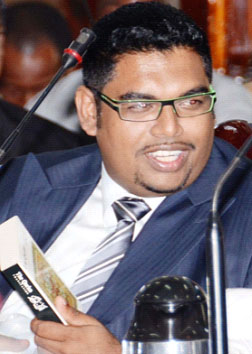Saying that the government’s proposed $267.1 billion budget is devoid of anything to rescue what he described as the country’s ailing economy, PPP/C parliamentarian Irfaan Ali yesterday accused the APNU+AFC administration of telling a “good lie” instead of delivering on its promised “good life.”
Leading his party’s response to the 2018 budget in the National Assem-bly yesterday, Ali said the economy has lost its vibrancy and continues to “limp along towards the elusive good life concept,” evident from the suboptimal growth registered over the past three years.
“Mr. Speaker, the carnage of our economy is also reflected by depreciation in the principal exchange as well as the deterioration in the balance of payments. Due to the poor performance of our export sectors, the principal exchange rate suffered the sharpest decline since the liberalisation in the foreign exchange market as the demand for foreign currency outstripped supply,” Ali observed.
To the accompanying chants of “decline, decline” by some of his colleagues on the opposition side, Ali pointed out that there have been major declines in various areas and the budget presented nothing to address the situation.
As for the business sector, he said that the business environment has become very toxic and the country has slipped on the various international indices.
As he gave his various figures, Minister of Business Dominic Gaskin looked at Ali with an arched eyebrow at times but even though he spoke just after he did not respond to any of the claims made.
As to the fiscal measures proposed in the new budget, he said it is “clear as daylight” that these are woefully inadequate and can only generate suboptimal results, similar to those generated by all the budgets under the current administration.
For example, he declared that the budget provides no comfort to parents as it did nothing to correct the taxes placed on educational supplies.
While Finance Minister Winston Jordan announced in his budget presentation that the controversial Value-Added Tax (VAT) that was placed on private education would be withdrawn, Ali pointed out that educational supplies are still being heavily taxed.
He also claimed that there is little in the budget to revive the key export sectors and the country’s economic base, or improve the wellbeing of the average Guyanese, especially vulnerable groups, such as single parents, the youth, and pensioners.
According to Ali, while Jordan wants Guyanese to believe that the budget will stimulate and diversify the economic base of the country, the forecast in the analytical summary for the balance of payments suggests otherwise. According to this summary, Ali said, the export revenue from bauxite is expected to be stable while the export receipts from sugar and rice are expected to decline by 14.6% and 9%, respectively. And while gold is expected to account for 58% of the country’s exports, Ali said this points to the fact that Guyana’s growth prospects will be heavily dependent on one commodity.
Ali also suggested a number of measures to be taken should the government seriously consider stimulating and diversifying the economy, therefore fulfilling its promise and delivering the “good life” instead of perpetuating what he dubbed a “good lie.”
These include restoring the purchasing power of the people by removing the imposition of VAT on previously zero-rated items; removing new fees imposed in the 2016 and 2017 budgets; working with the commercial banks to delay/stop foreclosures and the execution sales in the housing, agriculture and retail sectors and work out ‘soft payments;’ hiring an international firm to trace assets held overseas by former and present government officials; re-commencing the controversial Amaila Falls hydropower project as recommended by an independent Norwegian consultancy firm; taking urgent steps to immediately remedy the constant and frequent blackouts affecting all citizens; and reversing present policy and establish more lenient terms of repayments for students at the University of Guyana.
Ali also suggested that the government increase the monthly old age pension to $25,000 from the current $19,500; take immediate corrective action to ensure that all health facilities countrywide have adequate supplies of needed drugs; reverse the implementation of VAT on agricultural inputs; take immediate measures to save the sugar industry; and resume negotiations with the government of Venezuela with the intention of selling rice and paddy to the country.
As a very animated Ali spoke, for the larger part of his speech he drew no reaction from the government side. Towards the end of his speech, Minister of Public Security Khemraj Ramjattan did heckle him but otherwise most of the government ministers appeared to be catching up with other things, so much so that after Ali took his seat Speaker Dr. Barton Scotland made it clear that members should not be reading newspapers or any other documents unrelated to the budget during presentations.
Fellow PPP/C parliamentarian Joe Hamilton, in his presentation, told the House that Guyanese people are unable to feed their children and pay their bills.
He accused Gaskin, who spoke immediately before him, of saying almost the same things in all four of his budget presentations. Hamilton said he has all of Gaskin’s speeches—“They make a good read, right?” the minister quipped—and nothing has changed over the past two and a half years.
Hamilton also spoke of the sloth in implementing plans announced in the previous budgets. He specifically accused Ramjattan of failing to build a new prison, which he charged resulted in the destruction of a prison block and the loss of 17 lives. The budget, he said, is spiced with plans that are “going no place” and would not impact the lives of Guyanese.
Hamilton also asserted that a “smiling” Prime Minister Moses Nagamootoo cannot get constitutional reform right–the only thing the Prime Minister has responsibility for, according to him—and instead he is “eating birthday cake.” “And what is wrong with that?” asked government’s Chief Whip Amna Ally.

